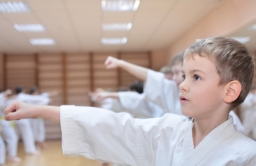Does sport help children and young adults with ADHD?
Tuesday, November 4, 2014 - 10:00

Although research on the effects of exercise on youth with ADHD is fairly recent, the research looks promising. A study published last year in the Journal of Pediatrics shows "that kids with ADHD can better drown out distractions and focus on a task after a single bout of exercise." Studies have also shown that activities that tax the attention system and require an intense focus on body movements such as gymnastics, swimming, diving, wrestling, tennis, ballet and martial arts can be great for kids and young adults with ADHD. These individual sports offer structure and a low frustration factor while also being active and engaging.
Team sports can be challenging for a child with ADHD (but not impossible) because the variables can be overwhelming. Team sports such as football, basketball and baseball that require a lot of physical contact, as well as attention to strategy, placement of players and zones can be unsettling or confusing.
Some of the general characteristics of someone with ADHD are:
- General inattentiveness - very easily distracted, may not appear to be listening when spoken to.
- Hyperactivity - movements can be excessive, particularly when calm or quiet is required.
- Impulsiveness - can act out and may break rules without thinking, many times they can have difficulty waiting their turn, interrupt someone while speaking or talk excessively.
Coaches of children with ADHD should keep the following in mind:
Communicate effectively: Keep directions firm and clear. Children with ADHD may get lost in group direction but do really well with one-on-one instruction from their coach. If a child seems confused or disengaged, try to find out where the breakdown occurred so you can solve the problem and move forward.
Keep them moving: If you are coaching a team, move players around so that every child on the team has the opportunity to participate. New positions allow the player to burn excess energy and develop new skills. Keep them busy during down times: get them to help with scoring or managing the equipment, anything to keep them engaged and interested.
Manage the excitement: Children with ADHD may get caught up in the moment and forget about teamwork and strategy. Discuss the formation of a break plan with the child’s parents in advance in advent the child gets overwhelmed.
Stay positive: As with any other athlete, assess their strengths, emphasize them during practices sessions and use them to the team or individual’s advantage during competition. Remain open to making adjustments and modifications and keep an open dialogue with the parents of the child so that you, the parents and the child can get the best out of the experience.
The information provided is to be used as a guideline since each child will be different, with varying needs and abilities. If you are coaching someone with ADHD, as with any athlete, speak to the person first or in the case of young children, their parents so you can best determine what their goals and abilities are and work forward from there.
References from the SIRC Collection:
1. Team Sport, Individual Sport, Coaching, Hyperactivity, Children, Mental Health, Attention Deficit Hyperactivity Disorder (ADHD)
2. Kreher J. Attention Deficit/Hyperactivity Disorder (ADHD) in Athletes. International Journal Of Athletic Therapy & Training. May 2012;17(3):15-19.
3. Physical activity and cognitive performance in children with attention deficit hyperactivity disorder (ADHD). Journal Of Sport & Exercise Psychology. July 2, 2009;31:S11-S13.
4. Verret C, Gardiner P, Béliveau L. Fitness Level and Gross Motor Performance of Children With Attention-Deficit Hyperactivity Disorder. Adapted Physical Activity Quarterly. October 2010;27(4):337-351.
5. Ying-Yi C, Lih-Jiun L, Jing-Min L, Wei-Tso H, Lan-Yuen G, Wen-Lan W. Timing perception and motor coordination on rope jumping in children with attention deficit hyperactivity disorder. Physical Therapy In Sport. May 2013;14(2):105-109.